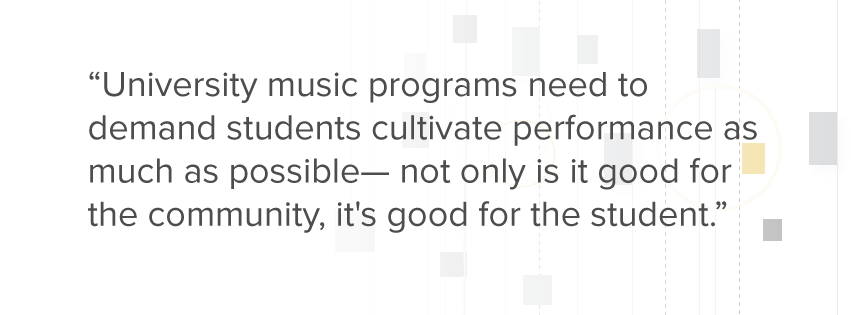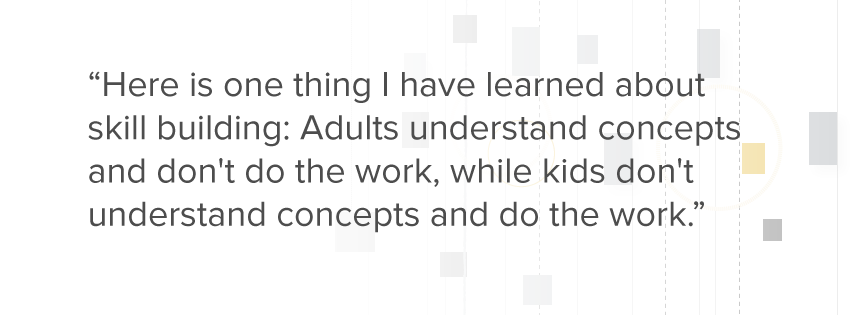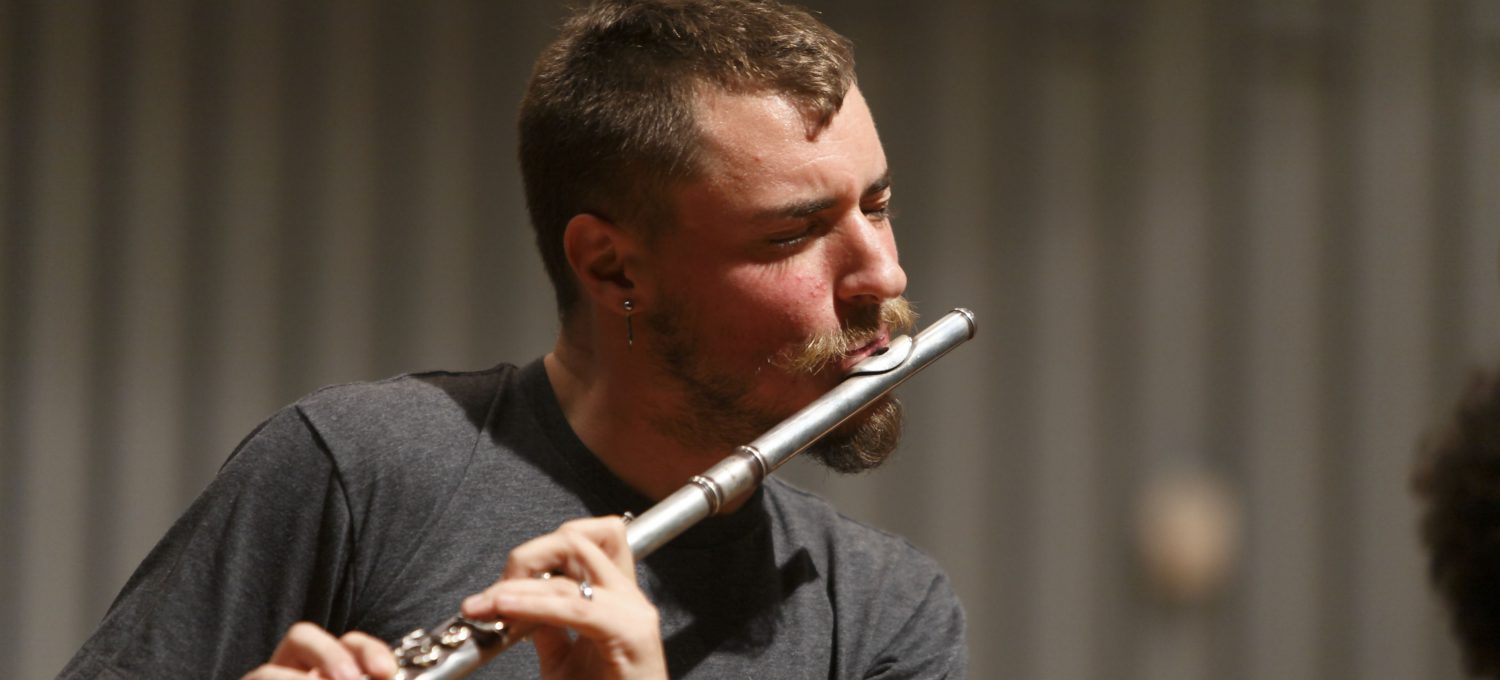At the National Flute Convention I had the opportunity to hear Greg Pattillo solo with the late night jazz band. I’d heard him many times, but each time is always better than before. Inside the well-lit ballroom he had people on their feet dancing. In the corner, a seemingly innocent woman was flipping the ballrooms lights off and on as to create a disco-ball effect.
How does this guy do it? I briefly spoke on the phone with Greg last week and here are some starting points.
1. Perform. Everywhere.
Did you go to a college for a performance degree? How often did you perform a recital during your degree—once, twice? Unfortunately sometimes performance degrees neglect to teach how to perform— and make money doing it. University music programs need to demand students cultivate performance as much as possible— not only is it good for the community, it’s good for the student.
Aspiring professional flutists have a wealth of performance venues available to them. Nursing homes, subways, schools, open mic nights, and other community functions are great ways to practice performing regularly. “All musicians should be playing in front of kids— even if they’re still a student in school” Pattillo says.
Even if many of your first performances are unpaid — take them. Pro bono gigs can be an important step towards earning a paycheck. Not only does it strengthens your community ties, but playing in different venues introduces you to people in all types of industries. That lawyer that heard busking on the street? He probably needs music for his holiday party. Do you know how to pitch your music to strangers? Laid back performance settings give you the opportunity to practice.
“I still go into the subways and play for many reasons — to practice memorization.”
Pattillo reinforces the idea that playing in less formal environments is great for trying out new pieces. Playing for people in the subways allows him a chance to perform, yet not be the center of attention.
“I’m not going to attempt to play something 100% learned and memorized without having tried it out in the subway first.”
Aspiring musicians should be learning to juggle multiple performances to be successful in the real world. Pattillo also spoke of the importance of being tuned into your audience, which will be the topic of another article.
“A funk band is always watching the audience to make sure they are “feeling” it. Classical musicians, on the other hand, are frequently less in tune with their audience and more concerned about missing notes.”
2. Memorize your music
All flutists should be playing by memory— regardless of age or talent. Playing off book requires you to know the music you’re performing by heart. The results of learning your music so intimately will be felt by your audience.
“When I was a young student, my teacher made me memorize everything I performed” says Pattillo. “A mentor of mine at conservatory once said ‘It isn’t memorized until you are able to solfege your music by memory.”
“This is a great tip because it enables you to practice your memorization when you are on the go, even running errands, and don’t have your flute with you.”
Harkening back to the first tip, practice memorizing in many types of venues–especially for other students at schools.
3. Learn from doing. Learn to fail in a safe place…
If you want to learn to play the flute well, or any instrument for that matter, you will need to find a private teacher. There is simply no substitute for this. Having a teacher is indispensable, but you shouldn’t let your flute lessons stifle your curiosity about other styles of music. A quality foundational education can be used to pivot to any style of music.
If you want to learn any new style these days, a great place to start is YouTube, and using the internet in general. You can go straight to the source of so many different styles and icons, the only limit is time to digest it all.
“If you want to learn more about Jazz, you don’t need to be bummed if your teacher doesn’t know how to teach it to you. Instead, go down the rabbit hole of the internet and start exploring. Go to a club and watch it live. Work your ears, transcribe the music, learn the form, and be aggressive: try to get in a place where you can feel comfortable trying to sit in during a session. Only then will you realize the work that needs to be done. But it can be done with a systematic, goal oriented approach. This can work with virtually any style (outside of classical music, really).”
“For instance, I learned beatboxing not from a teacher, but by showing up over and over to neighborhood jam sessions in San Fransisco fronted by MC’s, poets, and beatboxers. I used my classical education to pinpoint weakness and growth areas in my playing, and targeted what I needed to work on to be able to make new and strange sounds. I eventually started to jump in, and even though I only had a few beatbox sounds in the beginning, it was so thrilling to see weekly progress through the admiration of my peers. That really helped motivate me to practice hard and amass skills.”
“Kids are not as scared to fail— or experiment. If you don’t fail in front of people, you’ll never get the focus to get outside the box. Failure is an opportunity to learn.”

“But make sure you fail in a safe place— not at a paying gig. This is one of many facets of the ‘childlike mind’ that can be honed for your benefit. Re-evaluate what a performance can be, what it can be for if you do many of them, and what can be programmed.”
- What would your audience like to hear?
- What would you like to play (rather than just what your teacher needs you to play)?
- Can you turn it into something fun and playful, rather than something scary and nerve racking?
“Consider performance as a true celebration of all the hard work that you have done, and do!”
![]()
About Greg
Greg Pattillo is recognized throughout the world for his redefinition of flute sound. Greg was lauded by The New York Times as “the best person in the world at what he does.” His groundbreaking performance videos on Youtube, showcasing “beatbox flute”, have been viewed more than 40 million times.
As an Internationally acclaimed performer, educator and clinician, Greg can be found both on the concert stage and on the streets, subways and parks, sharing and preaching his sound. After earning his masters degree from the Cleveland Institute of Music, Greg found work as the acting principal flute of the Guangzhou Symphony Orchestra, became a founding member of the Collaborative Arts Insurgency and the 16th and Mission Thursday night gathering for performers in San Francisco.
Mr. Pattillo currently resides in Brooklyn, NY and performs with the PROJECT Trio, an ensemble of genre bending performers emerging from classical music roots. Greg Performs exclusively on Brio! and Gemeinhardt flutes.

